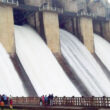Kozhikode/Bengaluru: After prolonged difference of opinion on the proposed Thalassery-Mysuru railway line, the Kerala and Karnataka governments have agreed to conduct a survey before preparing a Detailed Project Report (DPR) on the revised Thalassery-Mysuru line via Manandavadi in Kerala.
The railway line will pass through Koothuparamba, Manandavadi, Kutta, Kanoor, Balele, and Thithimathi to reach Mysuru.
The agreement was reached following a high-level meeting between officials led by Kerala Chief Secretary K.M. Abraham and Karnataka Chief Secretary Subhash Chandra Khuntia in Bengaluru on Thursday. Konkan Railway Corporation Limited will conduct the physical survey.
Kerala Rail Development Corporation Limited and the Railways, formed on 51:49 equity partnerships to develop railway infrastructure in the State, will foot the bill for the survey.
Both the governments have expressed interest in the revised route via Manandavadi, given that the line will cause minimum ecological damage.
For the record, the project was taken up for discussion at a meeting between Chief Minister Pinarayi Vijayan and Railway Board Chairman Ashwani Lohani in Thiruvananthapuram recently.
New station at Periyapatna to connect Kushalnagar
Sources said that a new station at Periyapatna would be included in the proposed route so as to link it to the proposed Mysuru-Kushalnagar (Kodagu) railway line, for which a survey is being conducted.
With the agreement, two earlier projects — Thalassery-Mysuru railway line, in which the Kerala Chief Minister’s Office had expressed interest and Nilambur-Nanjangud line — have been dropped, they added.
The rail network will not disturb any of the protected places such as Brahmagiri Wildlife Sanctuary, Nagarahole National Park and Bandipur Tiger Reserve in Karnataka.
Once the DPR is ready, the Ministry of Railways will begin procedures to conduct an environmental impact assessment and obtain mandatory clearances from multiple agencies, including the Union Ministry of Environment, Forest and Climate Change, and finally present the recommendations of the National Board for Wildlife, chaired by the Prime Minister, to the Supreme Court.






